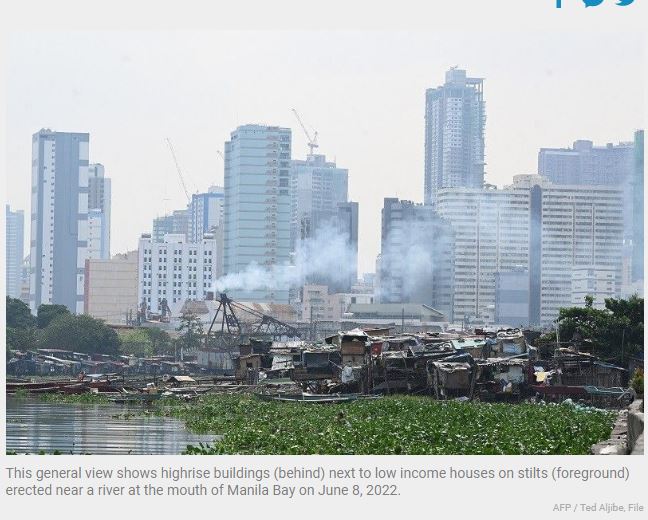Philippines: Call for wealth tax revived as 9 richest own more than bottom 55M Pinoys do
MANILA, Philippines — A wealth tax could fatten the Philippines’ tax haul as the growing number of dollar millionaires exposed the realities of inequality in the country, global nonprofit Oxfam said.
Erika Geronimo, executive director of Oxfam Pilipinas, reckoned that the ranks of millionaires in the country have grown by 43.5% since 2012.
The statement came as the global elite has nestled themselves in a posh Swiss ski resort for the World Economic Forum, where President Ferdinand “Bongbong” Marcos Jr. and an entourage of government officials and business magnates are in attendance.
“Inequality experienced in the Philippines is starker with the nine richest Filipinos having more wealth than the bottom half (55 million) of the population,” she said.
Oxfam Pilipinas qualified that figure as Filipinos whose wealth bloated upwards of P278.24 million, or $5 million, and beyond.
The figures are even more severe in a global context. Oxfam noted that the richest 1% amassed two-thirds of new wealth generated since 2020, at an estimated total of $42 trillion. This is equivalent to twice as much money generated by the “bottom 99%” of global population.
Geronimo argued that if a wealth tax, targeted especially towards Filipino millionaires, is passed into law, this could leave the country $3.8 billion wealthier.
“This amount is enough to increase our health budget by two-fifths,” she added.
Data from the Bureau of Treasury showed that the country’s tax haul grew 12.5% year-on-year to P237.1 billion as of November 2022. Year-to-date, collections expanded 12.6% on-year to P2.2 trillion.
Super-Rich Tax bill
Suggestions to impose a wealth tax on the elite have been floated within the legislature in the past two years. The Makabayan bloc at the House of Representatives has refiled a Super-Rich Tax bill which proposes a 1-3% tax on billionaires.
They said it would raise around P236.7 billion a year from the 50 most wealthy Filipinos alone.
Proponents said the tax on billionaires would help fund government programs and social services for the poor and “would further help shift the burden away from regressive consumption taxes toward the handful of the wealthiest who can contribute more to our public coffers.”
The bill, which was also filed during the Duterte administration, has been pending at the committee level since last July. Congress, like most in government, is dominated by the landed, the wealthy, and the elite.
Under this new administration, economic managers said they were keen to pursue fiscal consolidation to boost revenues. This strategy, if realized, could see a host of new taxation measures and reforms which could burden Filipinos as economic conditions prove too harsh and difficult.
“It’s time we demolish the convenient myth that tax cuts for the richest result in their wealth somehow ‘trickling down’ to everyone else. Forty years of tax cuts for the super-rich have shown that a rising tide doesn’t lift all ships —just the superyachts,” said Gabriela Bucher, Executive Director of Oxfam International.
Oxfam’s new research hammered home a point about trickle-down economics.
“The very existence of booming billionaires and record profits, while most people face austerity, rising poverty and a cost-of-living crisis, is evidence of an economic system that fails to deliver for humanity. For too long, governments, international financial institutions and elites have misled the world with a fictional story about trickle-down economics, in which low tax and high gains for a few would ultimately benefit us all,” the report read.
As it is, the coronavirus pandemic widened the inequality gap around the world, especially in the Philippines. Filipinos continued to endure brutally-high inflation, which has persisted as the economy found its recovery from the pandemic threatened.
The combined effects of expensive fuel prices, supply-chain disruptions, and a weak peso have altogether battered the purchasing power of Filipinos. Inflation shrank the value of the local unit, as data showed a peso coin in 2018 was only worth P0.88 by the middle of last year.
Source: https://www.philstar.com/business/2023/01/16/2237993/call-wealth-tax-revived-9-richest-own-more-bottom-55m-pinoys-do


 Thailand
Thailand




